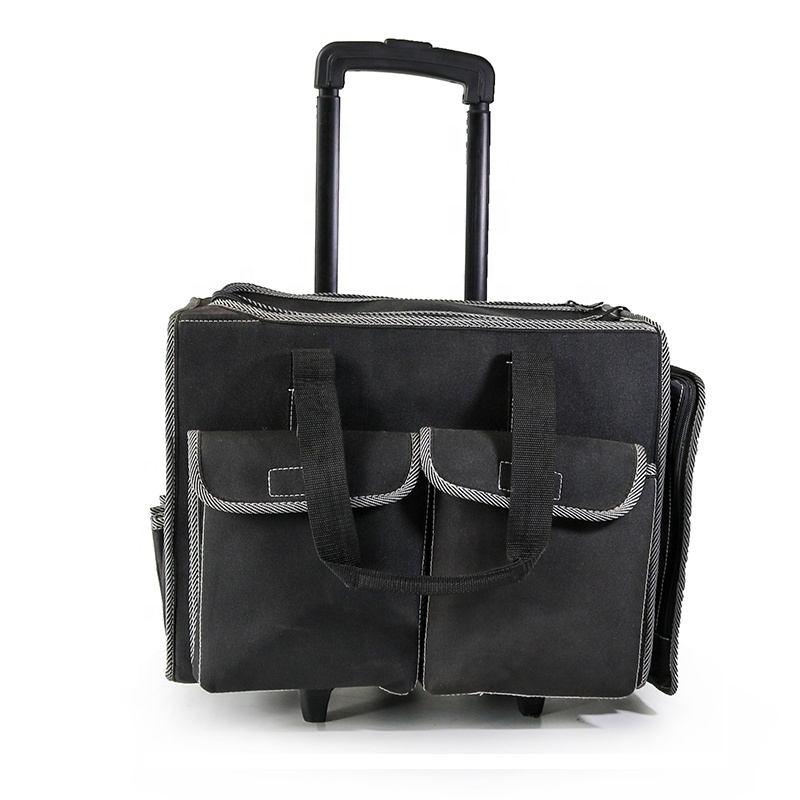Tool bag with wheels is a portable and convenient storage solution for tools and equipment. It typically features a large main compartment, multiple pockets, and a sturdy handle for pulling the bag along on its wheels.
Some popular features of tool bags with wheels include:
Tool Bag With Wheels,Tool Rucksack With Wheels,Tool Backpack With Wheels,Small Rolling Tool Bag ZHANGJIAGANG CITY XIANGLE TOOL CO., LTD. , https://www.xiangletoolbag.com

Tile market problems and more "three camps" show their magic
The article discusses the current challenges facing the ceramic tile industry, highlighting a significant drop in sales and a growing inventory problem. According to industry sources, ceramic product sales have declined sharply, leading to large stockpiles in manufacturers' warehouses. Previously, inventory accounted for about one-third of production, but now many companies are holding over half of their output in storage. The Foshan Taoli Office of the China Tao Association reported that more than half of local ceramic companies had shut down kilns due to rising inventories, with around 15% completely halting production.
This downturn is partly attributed to the weakening real estate market, which has begun to impact demand for ceramic products. Additionally, quality issues continue to plague the sector, further reducing sales. Some major Foshan-based ceramic companies have stopped kiln operations entirely, while those with annual sales exceeding 2 billion yuan have also significantly reduced production.
Recent spot checks by the AQSIQ revealed that out of 138 products from 135 companies across 11 provinces, 121 passed the tests, giving an overall pass rate of 87.7%. This has once again brought quality concerns into the spotlight. For ceramic companies, maintaining high standards is crucial—not just for compliance, but for long-term success. Strengthening quality control and building reliable distribution channels are essential steps for survival in this competitive market.
Industry insiders note that past crises were often linked to unstable product quality, which directly affected sales. Recently, reporters visited several dealers who emphasized the importance of quality in their purchasing decisions. Distributors, as key players in the sales chain, place the same level of importance on quality as manufacturers do. Industry experts believe that creating strong brands requires not only quality but also excellent after-sales service.
In response to these challenges, the Quality Supervision Department has intensified its efforts. On March 14, law enforcement officers conducted a special inspection at a materials market in Changsha Road. During the visit, a store failed to provide a valid 3C certificate and instead provided a product inspection report, later refusing to show the required documentation. As a result, the business was fined and ordered to submit to further investigation.
The 3C certification, or China Compulsory Product Certification, is a mandatory system designed to ensure consumer safety and product quality. It applies to certain ceramic products, particularly those with potential radiation risks. Only non-radioactive tiles can receive this certification, which is required for products like polished and antique tiles. Glazed wall tiles, however, are not included in the scope of this certification.
In Nanjing's tile market, prices for low- and mid-range domestic tiles have slightly dropped compared to last year, with prices ranging from 40 to 120 yuan per square meter. In contrast, imported and high-end domestic tiles have seen price increases, with some reaching over 180 yuan per square meter.
While imported tiles from countries like Italy and Spain are known for their superior design and quality, they are not the only option. Domestic brands have made significant strides, meeting and even exceeding international standards in certain aspects. For example, China's national standards for ceramic tiles are higher than European ones, especially in areas like surface smoothness and wear resistance. Domestic large brands offer cost-effective options without compromising on quality.
The "three camps" of the market each have their own strengths: imported tiles lead in design and quality, joint-venture brands offer good value, and domestic large brands deliver reliability and performance. Consumers now have more choices than ever, supported by the introduction of 3C certification, which provides a clear standard for environmental protection and safety.
Overall, the environmental performance of tiles sold in Nanjing’s major markets is considered reliable, and the 3C certification has given consumers greater confidence in their purchases. Several brands visited by the reporter were able to provide full documentation, showing a 100% pass rate in radiation testing.